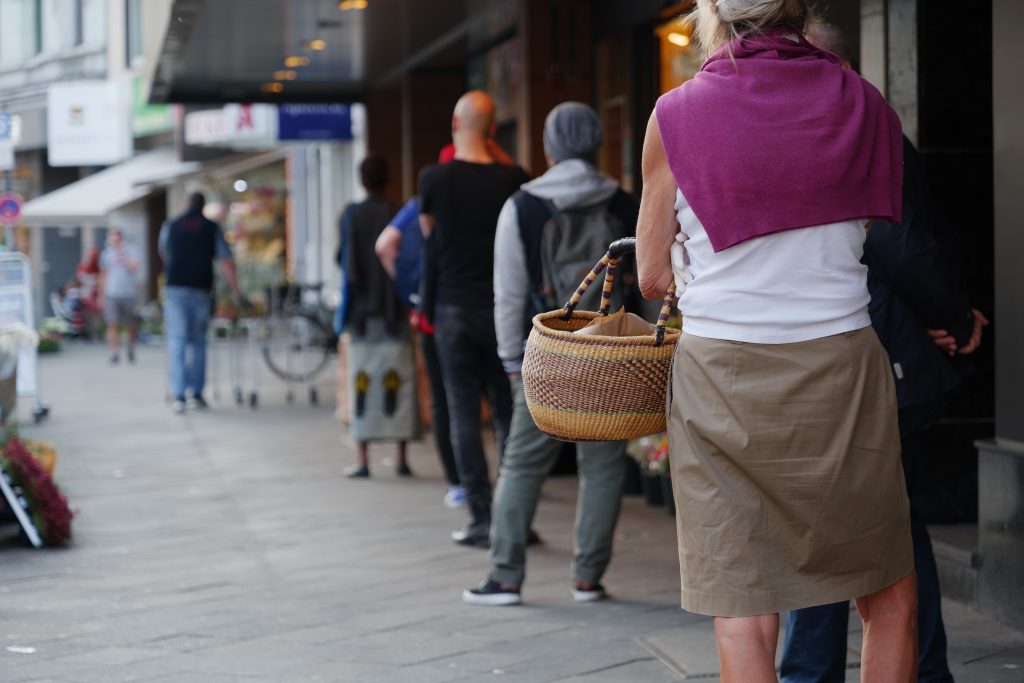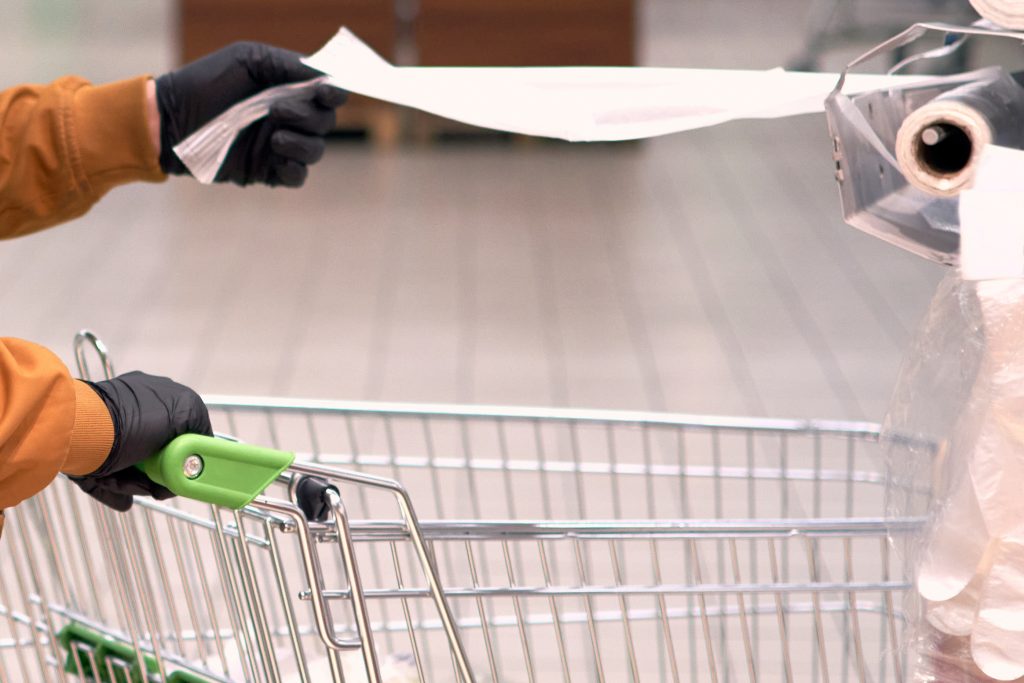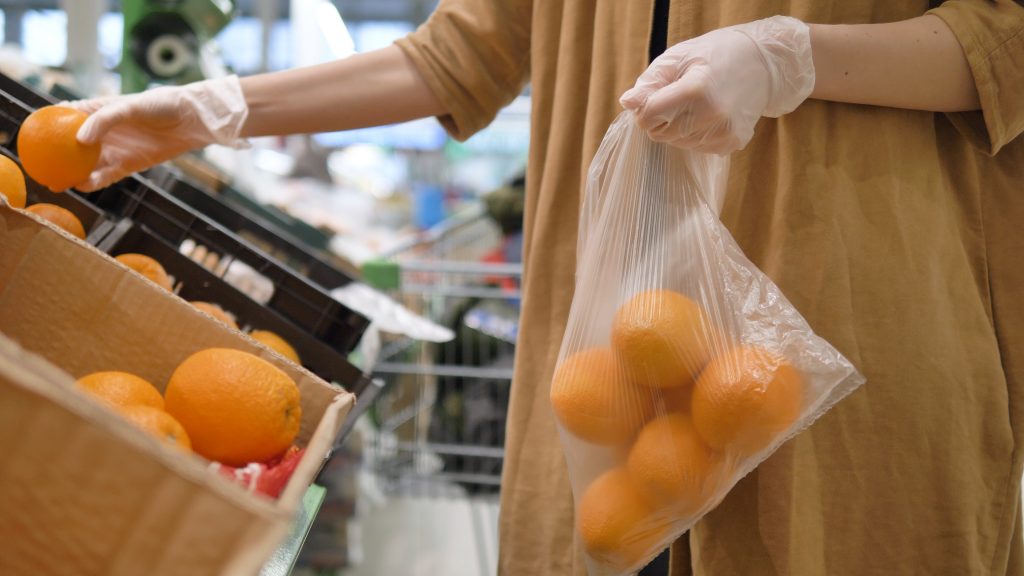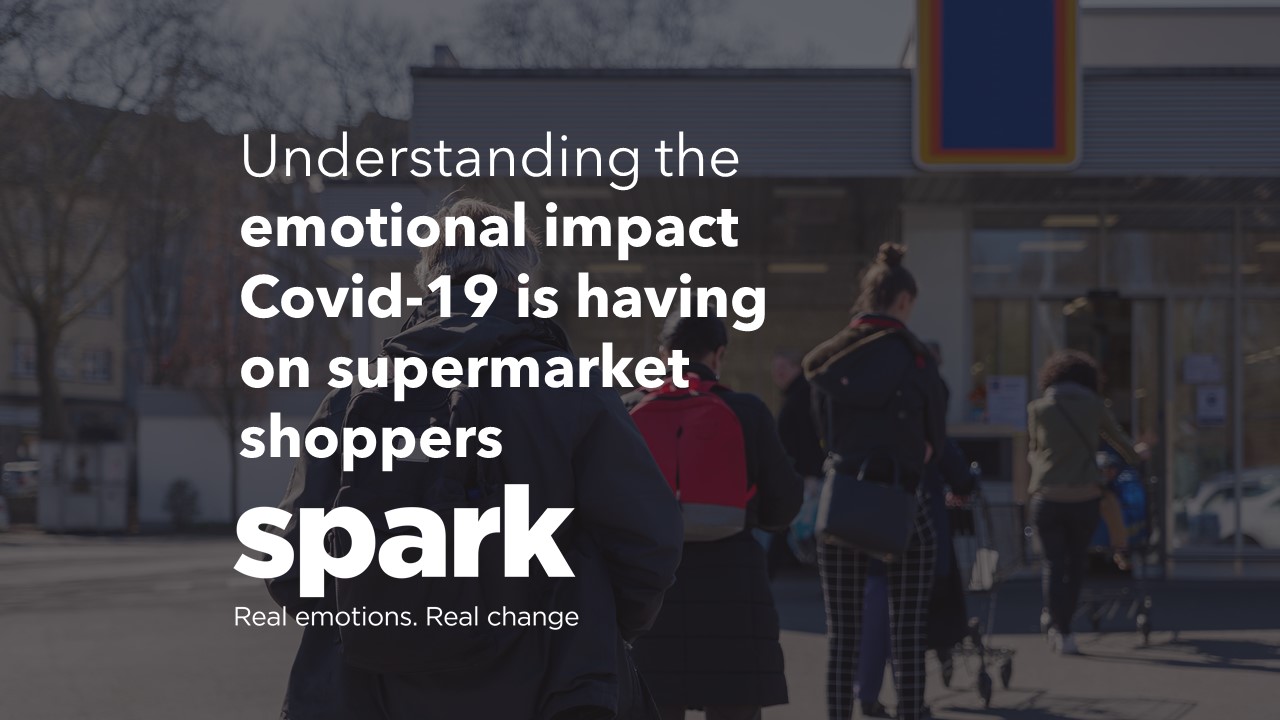We all know how COVID-19 has impacted our own lives, but at Spark Emotions, we wanted to understand how people are generally feeling about the current pandemic and the impact this has when they have to leave the house to shop for food.
Phil Adcock, Behavioural Scientist and published author of 3 books on consumer psychology, has analysed the initial results of our study on the emotional impact the COVID pandemic is having on supermarket shoppers and shared his expert opinion on what is happening.

The emotional impact of Covid-19 on supermarket shopping
Grocery shopping has dramatically changed in just the last few weeks alone. Before the coronavirus pandemic, shoppers would regularly visit their preferred supermarket, shop mostly on autopilot and invariably buy a bit more than they intended.
Suddenly, overnight, much of what we as a species had learned about grocery shopping was ripped away from us. It used to be that we could visit just about any time we preferred. Before the pandemic, the only queue was at the checkout. And as recently as March 2020, we had more choice in-store than ever before.
As a result, shopping for groceries was for some a pleasurable emotional experience. When shopping in our familiar supermarket environment, most of us felt a sense of calm pleasure as we hunted down the provisions we needed for the coming days. Shopping is not always considered as enjoyable, but for most, it certainly was not any form of exciting or confusing experience, from an emotional perspective. I use these words explicitly, as pleasure, excitement and confusion are the three cornerstones of every human emotion.
The latest research conducted by Spark emotions has uncovered, how we feel emotionally about a trip to the supermarket and how that has now changed: Changed dramatically! Shoppers have gone from feeling confident and curious before the lockdown to self-controlled and much more self-aware now.

The importance of emotion
Before we look at the specific data from the Spark Emotions study, let us briefly define human emotions. They are powerful; very powerful. Indeed. When comparing how we respond emotionally, compared with any reasoned or rational responses, the statistics speak for themselves;
- Emotion stimulates the mind 3,000 times faster than rational thought – George Miller (Psychologist).
- The emotional parts of the brain process sensory input 5X faster than the conscious cognitive part of the brain – Marcus
- The persuasiveness ratio of emotion to reason is 24:1 – Erasmus
Emotions are the result of 1 of 3 different mental processes: A fight response, A flight response and a find a mate response. We each have three different mental circuits for addressing any given situation we find ourselves in or stimuli we face.
- Fight = excitement and stimulation
- Flight = confusion and avoidance
- Find a mate = Pleasure and survival of the species
Each of these mental processes is active to a greater or lesser degree as we constantly emote. Every one of the 142 human emotions has a different combination of pleasure, excitement and confusion. For example, pride and confidence are both high in pleasure, medium in excitement but low in confusion. Conversely, embarrassment and guilt are both low in pleasure, low in excitement but high in confusion. Anger, on the other hand, consists of a lot of excitement, but less happiness and even less confusion.
Before the pandemic, supermarket shopping for most of us was very much an emotionally positive activity, as opposed to being fight or flight related’.
But the new study by Spark Emotions has revealed that our emotions towards a trip to the supermarket have changed significantly.

Grocery Shopping study results
We have been studying the emotions of shopping for more than 20 years now, and there is an emotional formula for the typical grocery shop:
Pre Covid-19 Grocery shopping: Pleasure 60% – Excitement 50% – Confusion 20%
Having now conducted a nationally representative study of shoppers and their emotional perceptions during the covid-19 lockdown, we can reveal that the formula is very different:
Covid-19 Grocery shopping: Pleasure 57% – Excitement 30% – Confusion 31%
“Unsure what to do, how to act, trying to avoid people and take time, trying not to panic when someone came back the wrong way and against the arrows.”
The emotional formula for grocery shopping has changed, since the onset of the pandemic, shoppers are feeling 10% less enjoyment towards shopping, 37% less excitement and 52% more confused. This dramatic shift in emotions is being driven by a number of factors.
Firstly, shoppers are more fearful: Concerned about catching the virus while out shopping. This fear is compounded by the copious warning signs and other safety measures being rightly taken by the supermarkets. What used to be familiar is now unfamiliar and threatening. This reduces excitement and increases confusion as shoppers now feel they have less control over their situation.
Secondly, social distancing has taken away a fundamental human need: To be able to ‘rub shoulders’ with other humans. Evolution has seen to it that humans are predisposed to exist in groups so that they increase their chances of both survival and procreation. We are now being ordered to stay away from others. Something that goes against our instincts and so once again drives up confusion.
Thirdly, we are now shopping, deprived of some of the sensory cues we used to take for granted. Touch is a powerful human sense that helps us determine if products are fresh, ripe, hot, cold, etc. But the covid-19 crisis means that suddenly, touch also means coming into contact with what other, potential virus carriers’ may have been in physical contact with. In summary, touching was an important part of product evaluation, but now, there is a much more significant perceived risk involved.

Comparing different stores
When we look into the Spark Emotions survey data at a deeper level, we see that different shoppers experience different emotions towards grocery shopping in specific retailers.
When it comes to providing a pleasurable shopping experience during the Covid-19 crisis, Asda comes out top, scoring 66% compared to the overall average of 57%.
When we look at excitement levels: Which retailer provides the most stimulating shopping experience during the crisis, M&S scored an impressive 56% (from a small sample) and Asda returned a score of 40%. The average response overall was 30%.
As a generalisation, the more upmarket supermarkets were perceived as more pleasurable and more exciting than the mainstream stores and the discounters. But Asda was the anomaly.
Moving on to levels of emotional confusion, M&S (22%) and Sainsbury’s (24%) did the best job of minimising shopper confusion. The average confusion score was 31%.
Comparing shopper emotions
In this study, there was no significant differences between male and female responses to grocery shopping.
The Spark Emotions study also looked at how different ages of shopper emotionally responded to supermarket shopping. And although there were not any differences looking at pleasure and excitement, there was a consistent pattern in that the older the shopper, the less emotionally confused they were about grocery shopping.
There was another fascinating insight from this study, that although not directly related to grocery shopping is worthy of mentioning. The study ran over several days, and we saw significant increases in pleasure and excitement on days when the news headlines were more positive. Specifically, the highest pleasure ranking was on the day that it was announced that the government had reached a target of 100,000 coronavirus tests per day.
We hypothesise that supermarket shopper emotions are influenced by events outside the control of the supermarkets. But we also have plenty of evidence that emotions can be strongly moulded by specific activities and interventions in-store.

Summary and conclusions
When UK retail emerges from the Covid-19 crisis, retailing is going to be significantly different for the foreseeable future. From an emotional perspective, we predict that the retailers that incorporate shopper emotions (pleasure, excitement and confusion) will be disproportionately appealing as a result.
As shoppers we prefer a safe, pleasurable supermarket environment, that we trust, is familiar and that is easy to shop in.
What we do not want is to have to expend too much mental energy buying groceries. By this, it is well known that shoppers prefer the easiest route to their desired outcome. In psychology, this is known as processing fluency. The easier it is to shop for groceries, the more we prefer it.
It will be up to the retailers, and to a degree, individual brands, to look at shoppers and shopping to identify and minimise friction points. Those parts of the purchase process that are more difficult than they need to be. Typically, anything new that has to be learned is a friction point until we have managed to learn it.
In summary, grocery stores and grocery shopping has changed markedly. But humans as a species are notoriously slow at adapting to change. As shoppers, what we need now is as much help as possible, as we transition, adapt and evolve to our new shopping environment.
Spark Emotions is a global market research agency specialising in truly understanding the emotions and behaviour of your consumers, to find out how we can help you understand your customers better, please get in touch by clicking here.
Alternatively, if you would like to read more about how behaviour has been impacted by Covid-19, click here for more articles





